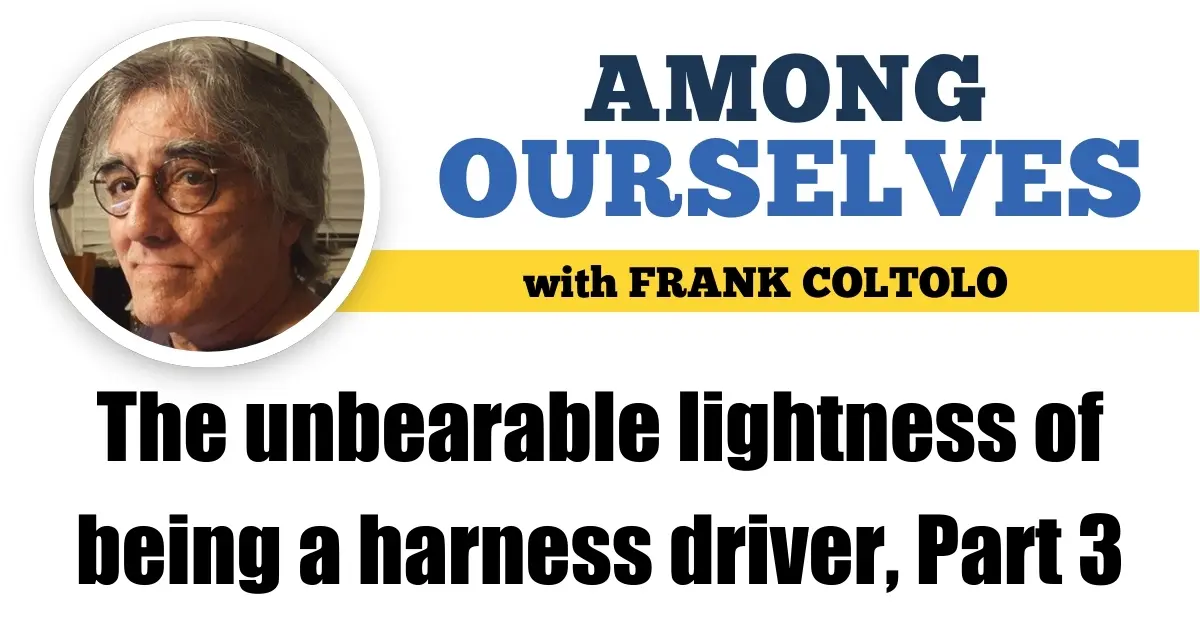The unbearable lightness of being a harness-racing driver, Part 3
by Frank Cotolo
Part 1 is here.
Part 2 is here.
As a journalist I found most harness racing drivers available to talk about their profession. I always brought to such a conversation the respect I have for the dangerous work they do; as well as I took their sides against unfounded popular opinion (see Part 2 above). Cat Manzi was among the top 10 that I interviewed for publication.
I was born around five months after Catello Manzi in the same state. I knew of him because I bet on him and against him when he was a regular on the New York and New Jersey circuit. In the early 2000s a set of circumstances conspired so we could talk on the record about his profession.
Working for YouBet when it was arguably the first ADW (Advance-Deposit Wagering) horse-race betting platform on the internet was a steady gig for me. I lived with a wife and family in rural Pennsylvania where my home was my office. The convenience gave me time to be thorough about handicapping harness for YouBet, keep my thoroughbred column at American Turf Monthly and continue writing comedy and fiction; all of which added cash to a well-paying position as YouBet’s initial harness racing editor.
YouBet hired a few harness drivers as promoters-in-the-field; high-profile. Their on-line presence was aimed at creating new fans for ADW cash flow. This is what put me in contact with Catello Manzi. He was at a peak. In 2005 he became the oldest harness driver (55) to lead North America in victories as well as five-digits in earnings.
What follows is the transcript of the interview Manzi gave YouBet. I concentrated on honest race-driving tactics with the aim of shedding bad-performer images to prospective fans before crabby veteran harness bettors and myths of corruption branded drivers crooked.
ME: When does a driver place emphasis on strategy as opposed to the pure speed of a pacer or trotter?
MANZI: You figure the strategy as you go. The horse has to show you what you can do with it. Most of the time I look at the program before I go out. I read the race lines. I go over a few scenarios in my head. Then when I am out there, I try to stay focused on them. Sometimes one of the scenarios happens and other times I have to adjust to what else is happening because a horse might go on the track and act different than usual.
ME: You’re racing over and over against the same drivers. Aren’t you acquainted with what they do more than a bettor?
MANZI: Some bettors can have just as good an idea of what drivers will do as I do. But any good driver tries not to fall into a pattern. As soon as they know you’re onto something they do, it can change. Drivers are pretty loose with styles but no one can expect them to do this or that.
ME: A driver told us that every driver’s perfect trip would be to go to the front and lead all the others to the wire. But there must be other perfect trips. What others do you like? Especially if you have a horse that is not a good leaver?
MANZI: First of all, there are some horses better without the cover; they work their way up themselves; even without going two or three wide. I’m old fashioned; there’s nothing wrong with a good second [catbird seat] trip.
ME: So, there are certain horses you don’t feel are threatened by not having cover?
MANZI: Yes. And a driver gets to know them. If you get to drive them a couple of times you find out if they like that so you don’t rush them.
ME: Then there are times when first over could be a perfect trip?
MANZI: Yes, especially when another horse goes for the lead and shouldn’t be there. If I drive a horse against that and I’m in the 2-hole, I stay there until I move [first over] on him.
ME: How do you keep going when you find your horse uncovered?
MANZI: There’s not much you can do. The only option is to conserve the horse’s energy. Maybe back off a little. It doesn’t mean the race is over. I’ve won in that position.
ME: But bettors are quick to feel a driver who tried to conserve a horse’s energy is slowing down on purpose.
MANZI: Yeah.
ME: I always think that’s unfair. There’s no way any race observer can understand what’s really going on out there like a driver can.
MANZI: Probably not. They should understand drivers are responsible to [connections] for making money. In the back of my mind, I think I do what’s best for them in a race. We’re supposed to be doing the best we can [with the horses we drive].

















